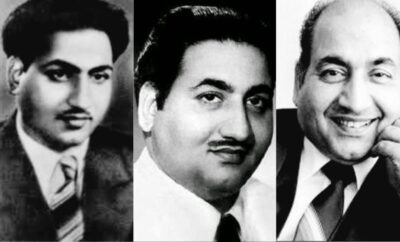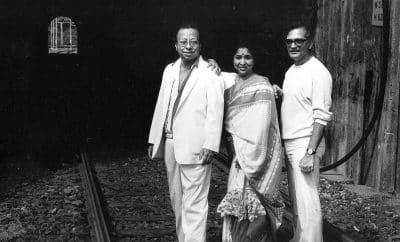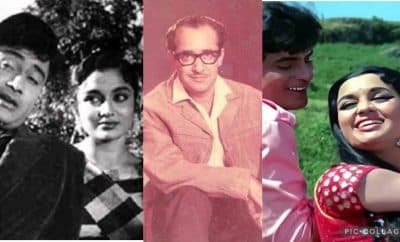People
India has many talented authors of film and music – Balaji Vittal
For all music and cinema lovers, Balaji Vittal needs no introduction. With books like R D Burman – The Man The Music, Gaata Rahe Mera Dil, S D Burman – The Prince Musician, he is one of the best authors in the world of music and cinema. His books on R D Burman and Gaata Rahe Mera Dil (with Anirudha Bhattacharjee) have won the National Award and the MAMI Award for the Best Book on Cinema in the year 2011 and 2015 respectively. Balaji Vittal has now come up with a book with a completely different genre. Pure Evil – The Bad Men Of Bollywood (You can buy the book by clicking on the title). He talks about the book, its making and much more.
Balaji Vittal in conversation with TheSongPedia.
1. What inspired you to write Pure Evil?
Balaji – The idea of doing a book on Bollywood Villains was proposed by Harper Collins. What inspired me was the idea of a book with the bad men as its lead characters. But what do I write about them? A mere description of their villainy would not suffice as those vile acts still needed a story to stand on. So, what would that story have to be like? I had no clue. But the idea of a book on Villains was far too exciting for me to let these mind blocks worry me. I said a ‘yes’ immediately. And for months afterward, I remained clueless about the story.
2. From writing about RDB, then Gaata Rahe Mera Dil and then SDB and now this book. Any specific reason you chose this subject? Since it is totally different from the genres you have written earlier.
Balaji – Being biographies of a particular individual, ‘RD Burman: The Man, The Music’, and ‘SD Burman: The Prince-Musician’ were centered around a finite list of albums. And ‘Gaata Rahe Mera Dil’, being a collection of short stories, had well defined small boundaries. But Pure Evil is about the last 90 years of Bollywood covering every genre of villains, their genesis, and the nuances within. It took me a while to even list down all the genres. And then, not every film that ever had a villain could be covered in the book. But covering too few villain characters would have made the story sketchy. This balancing act added more excitement.
3. It must have been a tedious task scanning Hindi films from the 1930s upto now. How did you sift through the content?
Balaji – The first task was to gather the content – archival material, published books, biographies, old magazines from the roadside book stalls in Delhi’s Daryagunj, video interviews and of course travelling to Mumbai for personal interviews with film personalities and film experts. The sifting came after I had firmed up the storyboard. The research material helped expand, flesh out and support the storyboard. Of course, not all the researched material could be used in the book. But having the material gave me some confidence.
4. The Contents of the book look very interesting. Tell us something about it.
Balaji – Pure Evil is not a collection of biographies of actors who played villain roles. Nor is it a collection of essays of those films. Pure Evil is a walk through the rogues’ gallery of Bollywood of the last 90 years in which every genre of villainy is showcased and discussed – the socio-economic or the socio-political events that triggered that genre of villainy, how that genre evolved, changed hues etc. For example, how the Bollywood policemen went from being honest to corrupt to criminals to ridiculous is traced in Pure Evil. Another example – the transformation of the small food grain hoarders in Footpath in the 1950s to the gold smugglers of the 1970s, to the drug mafia to the ‘D company’ of Bombay/Mumbai in the post 1980 era. Pure Evil is a story book. And of course, it is embellished with trivia and anecdotes gathered from personal interviews
5. How different was it from writing your earlier books? What difficulties did you face while writing this book?
Balaji – Very, very different. My earlier books were all about good men whereas Pure Evil is all about bad characters. The first hurdle was, as I said, was that I was not clear in my own mind what the core story of the book would be about. I was ably guided by my project guide Kaushik Bhaumik who asked me to first segment the entire landscape of villains by categories. And my friend Amitava Chatterjee suggested that I should try and write the chapter synopsis in a few sentences that would give me clarity to myself on what I wanted to say. The hurdles kept coming. But many, many well wishers and friends kept clearing the way for me. I am grateful to all of them.
6. Tell us your top 5 bad men/women of Bollywood.
Balaji – The obvious ones would be Gabbar Singh (Sholay), Mogambo (Mr. India), Shakaal (Yaadon ki Baraat), Kamini (Karz) and Bheeku Mhatre (Satya). But let me also share a few hidden gems which are my favorites – Dilnawaz (Aamir Khan in 1947 – Earth), Raghavan (Manoj Bajpayee in Aks), Dr. Aarti Mahajan (Tisca Chopra in Rahasya), Luke Morrison (Kay Kay Menon in the unreleased Paanch), Hemanta Roy (Kulbhushan Kharbanda in Andhi Gali) and Sundar Yadav (Yashpal Sharma in Gangaajal).
7. What were the major turning points in the evil genre of Bollywood?
Balaji – The 1st turning point came in the late 1930s with the coming of the social villain as opposed to the mythological ones. The 2nd turning point was the gangster genre who started out as thugs in groups of 5-10 with choppers and into black marketing and hoarding. Down the decades this category kept evolving and taking on myriad forms like the gold smugglers, the Vito Corleone type dons, the drug mafia, the bhai and so on. The 3rd turning point were the roles of Alok in Agni Pareeksha (1980) and Amol Khamosh (1985) of the mentally disturbed and the psychopath. It is unfortunate that these films didn’t do well commercially. But these two characters by Amol Palekar were the harbinger of what Shah Rukh Khan played in Darr and Baazigar a few years later. The 4th turning point was the coming of the trickster thieves in films like the Dhoom series, Players, Cash, Bunty aur Babli etc. I call this a turning point because finally it was a fair contest between the villain and the hero. Earlier the script would be unfairly biased in favour of the hero while the villain characters played by handsome, capable men like Prem Chopra and Pran would have to get humiliated and bashed up by the hero because the script dictated so. In the new millennium the parity was restored with the script giving equal opportunity to both the hero and villain. The 5th turning point was in Jaane Bhi Do Yaaro – the grey ensemble with all characters unpredictable and untrustworthy. It mirrored the real world we live in even more candidly. In the real life there is no one big Mogambo that we confront. It is a variety of antagonists. JBDY was exactly that.
8. As a part of research, did you interview the artists playing pure evils on screen? If yes, how was the experience?
Balaji – Oh yes! I personally interviewed about 45 actors, writers, film makers and I got very useful insights from them on how those roles were conceived and how the actors mentally and physically prepared for the roles and the anecdotes and back stories. I am really grateful to them for giving me their valuable time. And some of those interviews were great experiences in themselves. Kay Kay Menon asked me to come down to one of the major Raheja properties at about 9 pm. I arrived there and he too arrived quite punctually. He had just changed into jeans from his workout clothes. As we sat in the lobby, we realised that it was quite noisy. So, we walked to the poolside and did the interview with both of standing by the pool and me holding the laptop on my arm. After the interview I asked him if he was going home. “No”, he said. “I am going for a shooting now. 70% of my shoots are at night”. Ranjeet met me at one of the studios where he was shooting for a TV serial. In between the schedules I interviewed him – in his vanity van. It shut out the noise and I got his undivided attention. It is the only time in my life I have ever stepped into a vanity van of a film star.
9. For you, as an author, which was the most interesting part while writing the book?
Balaji – My biggest learning was – how little I know about films! There is so much to learn. And from that emerged the most interesting part – discovering something new every week. Writing Pure Evil was like a ‘Reset’ button. I was a student again.
10. How do you balance your day to day life and your life as an author?
Balaji – I write after packing up my day at 11 pm and on weekends. Its simple – cut out the television from your life and gain that critical 90 min a day. I used to be an ardent cricket fan but now I don’t watch it at all. I didn’t watch a single game of the T20 World Cup and barely a few overs of the IPL.
11. How has writing enriched your life?
Balaji – I discovered a new ‘me’ within me. And then, thanks to people like Malavika Banerjee, came the allied opportunities of hosting talk shows in Literary Festivals And that is a great feeling.
12. What motivates you to keep writing?
Balaji – If God has blessed with some writing and talking skills, I count those blessings and try to do justice to them to the best of my abilities. So that more blessings may keep coming my way, hopefully.
13. Amongst the list of your books, which one did you enjoy writing most?
Balaji – Pure Evil, obviously! Yes, even more than the RD Burman book because writing Pure Evil was like being strung and yo-yo’d on a delicious black web. ‘Living’ in the world of those criminals, murderers, rapists, dacoits, serial killers, bigots, megalomaniacs, sadists, psychotics, corrupt public officials, smugglers, goondas almost every day on You Tube, OTT or DVD for the last 3-4 years, I sometimes unconsciously started seeing their acts from their standpoint. Which is ok as a writer because it lends objectivity and balance to my writing. But thank God I did not catch the Stockholm syndrome.
14. Your future projects? Your message to our readers?
Balaji – Anirudha and I are authoring a biography of a highly respected film personality. And then I am very keen to venture into the fiction space. My message to the readers – please do buy books on cinema and music and read those. India has many talented authors of film and music. Please do check out their talent. You will be proud of them and their effort.



